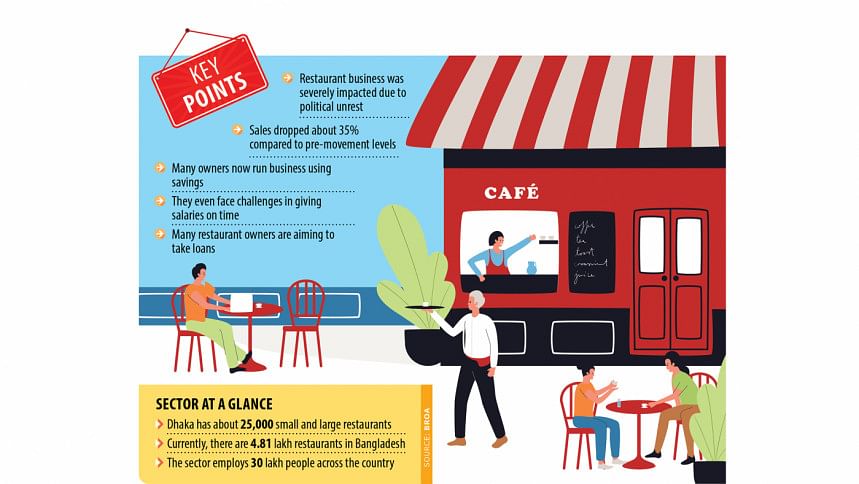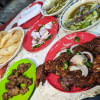Restaurants face sluggish sales as diners tighten belt

When Sheuly Akhter and her friend entered a branch of Star Kabab in Dhanmondi on Thursday last week, marking their return to the establishment for the first time in nearly four months, they were surprised by the lack of customers.
Unlike usual, they did not have to wait at all for seats while their order arrived within about 15 minutes.
Puzzled by this, Sheuly asked a waiter if everything was alright with the restaurant as it typically teemed with customers during her previous visits at the same time of day.
"Yes, we are fine," the waiter said. "But with everything getting pricier every day, we're not getting customers like before."
The waiter added that another reason for the poor turnout is the recent political changeover as people have become frugal amid the ensuing economic uncertainty.
Eateries across Bangladesh are facing a similar situation, with most reporting that customer footfall remains 30 to 35 percent below the levels seen in May
Eateries across Bangladesh are facing a similar situation, with most reporting that customer footfall remains 30 to 35 percent below the levels seen in May.
Customer turnout had fallen sharply in July and August, when curfews and internet blackouts were imposed to quell a student movement seeking reforms to the quota system for government jobs.
The unrest finally came to a head when a mass uprising ousted the Awami League government on August 5, followed by the establishment of an interim government on August 8.
However, this was only the most recent addition to the restauranteurs' long list of struggles.
For about a year now, their business has been struggling with a series of challenges, including the national election at the start of 2024 coupled with higher inflation since 2023.
Besides, the prolonged US dollar crisis has made imported ingredients more expensive while an inferno that broke out at the Green Cozy Cottage Shopping Mall on Bailey Road in Dhaka sparked safety concerns at restaurants.
Firoz Alam Sumon, chief executive officer of Al-Kaderia Restaurant at Rampura Bazar in Dhaka, said the prices of essential ingredients have almost doubled over the past three to four months.
"This has badly affected our business as we cannot suddenly increase food prices," he added.
Sumon informed that his daily budget for purchasing ingredients has gone up from Tk 10,000 just two-and-a-half months ago to around Tk 25,000 at present even though he purchases the same items in equal quantities.
"But even in this situation, we will face more challenges if we again hike the prices of foods," he said.
Sumon also informed that he would previously pay his employees by the 10th of each month, but now he has to wait till the end of the month before disbursing salaries in face of lower sales.
"I'm even having to borrow from friends and family to sustain the business," he said.
There are about 25,000 restaurants in Dhaka, with hundreds of them having sprouted over the past decade to cater to the demand for hygienic and quality food among city dwellers.
On a broader scale, there are 4.81 lakh restaurants across the country employing about 30 lakh people, according to the Bangladesh Restaurant Owners' Association (BROA).
Also, about two crore people are either directly or indirectly linked to the industry, as per data of the BROA.
During a recent visit to the Golden Chimney Restaurant in Banglamotor, one of the most heavily trafficked areas of the capital, it was found that customers were still largely missing.
Jafar Hossain, an official of Golden Chimney, said the restaurant used to get 15 to 20 customers around noon each day before the political changeover.
Like all the others, he blamed ongoing political instability, a lack of law and order and high inflation for the lower customer turnout.
Still, the situation improved slightly in September and October as more customers were arriving in the afternoon and evening hours.
"The more stable the country becomes, the more relief its people will feel," Hossain said.
Sabikoon Nahar, manager of a Herfy branch on Dhanmondi-27, said if they compare the customer footfall in the September-October period with that of July-August, they would find that business has not yet recovered 60 percent.
"People can't save as much as they did six months ago because of high inflation. For this reason, they are not coming to restaurants as often as before," she added.
Mohammad Golam Mustafa, general manager of the Sky Lounge in Mirpur-1 of Dhaka, said their sales had fallen by 70 to 80 percent between July and September.
They recovered by about 50 percent in September-October as customers gradually started returning, he added.
Mustafa pointed out that amid the current situation, most people have become cautious about spending too much on eating out.
As such, even people who would previously visit the restaurant thrice weekly now come just once at best, he said.
Imran Hassan, secretary general of the BROA, said the business situation was unbelievably bad in July-August, but it improved slightly in the months that followed.
"Still, recovery has not been as expected as sales remain 30-35 percent lower," he added.
Hassan also said that as soon as the government brings law and order under proper control, it will automatically have a positive effect on the restaurant business.
"In the current situation, many businesspeople are running operations by breaking their fixed deposit receipts, savings certificates and taking loans in many ways," he added.

 For all latest news, follow The Daily Star's Google News channel.
For all latest news, follow The Daily Star's Google News channel. 








Comments